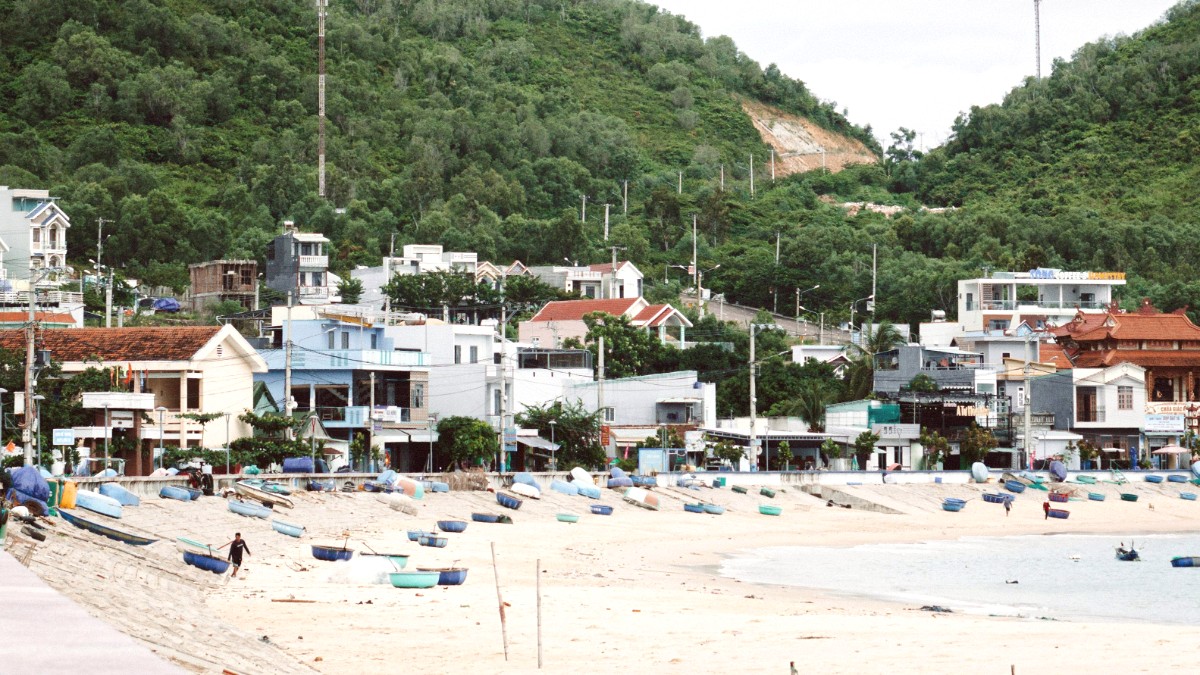
Vietnam
24-hour layover highlights: Morning: Arrive UIH, transfer to hotel near beachfront. Relax at Quy Nhon Beach. Lunch: Fresh seafood on Xuan Dieu Street. Afternoon: Twin Towers, Long Khanh Pagoda. Evening: Dinner in city, drinks at Surf Bar. For bookable experiences, check GetYourGuide.
Weekend getaway (2-3 days): Day 1: Arrive, Quy Nhon Beach, Ghềnh Ráng Tiên Sa Scenic Spot. Sunset drinks at Surf Bar. Day 2: Full day Ky Co Beach & Eo Gio adventure (organized tour recommended, including boat, snorkeling, seafood lunch). Day 3: Morning at Quy Nhon Market. Final local lunch. Depart from UIH.
Comprehensive plans for extended stays in Quy Nhon and Central Vietnam.
Day 1: Arrive UIH, hotel, relax on Quy Nhon Beach, seafood dinner. Day 2: Ghềnh Ráng Tiên Sa, Twin Towers, Long Khanh Pagoda, evening street food. Day 3: Full-day Ky Co & Eo Gio trip (snorkeling, seafood lunch). Day 4: Bánh Ít Cham Towers, Quang Trung Museum (martial arts). Day 5: Hon Kho Island or relax, Phương Mai Sand Dunes sunset. Day 6: Quy Nhon Market, cooking class, local specialties. Day 7: Departure.
Follow the One-Week Comprehensive Itinerary. For the second week, add multi-day extensions. 3-4 days exploring Da Nang and Hoi An to the north (by domestic flight or train). Also consider 3-4 days in Nha Trang to the south (by train or bus). This strategy allows a dive into Central Vietnam's diverse offerings and adjacent regions, enriching your overall travel experience.
Consider renting an apartment via Airbnb for more space and kitchen facilities. Focus on slow travel, immersing yourself in daily life. Take Vietnamese language classes. Explore surrounding villages and provinces at a leisurely pace. Look for local expat groups for social connections. Long-term stays foster a understanding of the local culture and environment.
Be flexible with your itinerary; sometimes unexpected discoveries lead to the best experiences. Do not overschedule your days, allowing time for relaxation and spontaneous exploration. Keep an eye on local events or festivals occurring during your visit; they offer unique cultural immersion opportunities and memories. Adaptability enhances your journey.
Tailor your Quy Nhon trip to your specific passions.
Explore Twin Towers, Bánh Ít Cham Towers, Quang Trung Museum, Binh Dinh Museum, Long Khanh Pagoda, Quy Nhon Cathedral.
Street food exploration, Quy Nhon Market visits, local specialties: Bánh Xèo Tôm Nhảy, Bún Chả Cá, Nem Nướng. Consider a cooking class.
Snorkeling/diving at Ky Co & Hon Kho, sandboarding at Phương Mai dunes, cycling, light hiking at Eo Gio and Ghềnh Ráng.
Quy Nhon caters to various budget levels, offering options for every traveler.
Accommodation options include hostels or budget guesthouses. For food, rely almost entirely on street food and local eateries. Transportation mainly involves local buses or GrabBike, complemented by extensive walking. Focus on free attractions (beach, walking, pagodas) and low-cost entry fees (e.g., Cham towers). Consider joining group tours for Ky Co to split costs.
Accommodation includes comfortable 3-4 star hotels with amenities like pools. Dining encompasses a mix of local eateries, mid-range restaurants, and occasional nicer meals. Transportation mainly uses GrabCar or taxis for convenience. Motorbike rental offers flexibility. Booking organized tours for major excursions like Ky Co and paying entry fees for all attractions are standard.
Accommodation options include FLC Quy Nhon Beach & Golf Resort or Anantara Quy Nhon Villas. Fine dining at resorts and upscale restaurants defines meals. Transportation uses private car services with a driver. Activities include private boat tours, indulging in spa treatments, playing golf, and other premium experiences. This approach emphasizes comfort and bespoke services.
Combine aspects of budget and mid-range travel for a balanced approach. Find deals on hotels to save on accommodation. Eat local for most meals but splurge occasionally on a special dining experience. Utilize a mix of public transport and ride-hailing for efficient travel. Focus on activities offering good value for money, maximizing your travel budget.
Dry Season (March-September) presents the ideal time for all beach and water activities. Swimming, snorkeling, and boat trips to Ky Co and Hon Kho are popular. Perfect for sunbathing and enjoying the coastal scenery. Be prepared for hot temperatures, especially in July and August. Book popular tours and accommodation in advance as it is high season.
Rainy Season (October-February) presents better conditions for cultural touring and indoor activities. Museums, pagodas, and market visits are less affected by rain. Attractions will be less crowded. Be prepared for frequent rainfall and potential storms. Outdoor activities may be limited. Temperatures are cooler, especially in December-January. Pack a rain jacket and waterproof gear. Enjoy lush green landscapes.
Adapt your itinerary to the seasons for the best experience, including festivals and off-season opportunities.
Check the Vietnamese national holiday calendar. Major festivals, like Tết, often draw significant crowds and impact service availability. Pre-book everything well in advance if your visit aligns with these periods. Festivals present unique cultural immersion opportunities and atmospheres, but demand careful planning.
Traveling during the low season (rainy season) often presents significant cost savings and fewer tourists. Embrace the slower pace and focus on cultural experiences less dependent on weather. Be flexible with outdoor plans due to potential rain. This approach offers a more relaxed and authentic glimpse into local life without the bustling crowds of peak tourist times.
Optimize your Quy Nhon visit by choosing activities aligned with the season.
Be flexible with your itinerary. Sometimes unexpected discoveries lead to the best experiences. Do not overschedule your days; allow time for relaxation and spontaneous exploration. Keep an eye on local events or festivals occurring during your visit; they offer unique cultural immersion opportunities.
Traveling during the low season (rainy season) often presents significant cost savings and fewer tourists. Embrace the slower pace and focus on cultural experiences less dependent on weather. Be flexible with outdoor plans due to potential rain. This approach offers a more relaxed and authentic glimpse into local life without the bustling crowds of peak tourist times.
Outdoor activities are subject to weather, especially in the rainy season.
Expect increased crowds and prices during major Vietnamese holidays.